
Theory of Computing
Scope & Guideline
Fostering Excellence in Computational Research
Introduction
Aims and Scopes
- Complexity Theory:
A central theme in the journal, exploring the classifications of computational problems based on their inherent difficulty and the resources required to solve them. This includes work on NP-completeness, hardness of approximation, and quantum complexity classes. - Algorithms and Data Structures:
Research that delves into algorithm design, analysis, and the development of efficient data structures. Topics include approximation algorithms, randomized algorithms, and algorithms for specific problem classes such as flow networks and graph algorithms. - Quantum Computing:
An emerging area of focus reflecting the journal's commitment to advancing the understanding of quantum computation. This includes studies on quantum algorithms, quantum complexity classes, and the implications of quantum mechanics on computational theory. - Pseudorandomness and Derandomization:
Research aimed at understanding the role of randomness in computation and developing methods to simulate randomness deterministically. This includes pseudorandom generators, derandomization techniques, and their applications in algorithm design. - Graph Theory and Combinatorial Structures:
The journal features works that investigate the properties and complexities of various combinatorial structures, particularly graphs. This includes intersection problems, communication complexity in graph settings, and the study of network flows.
Trending and Emerging
- Verifiable Quantum Computation:
With a rising number of publications addressing quantum computation, particularly in the context of verifiable delegated quantum computation, this theme is gaining traction. The relevance lies in the increasing importance of quantum technologies and the need for trust in quantum systems. - Randomized Query Complexity:
A notable trend is the exploration of randomized query complexity, emphasizing the efficiency of algorithms in terms of query access to data structures. This area is crucial as it impacts various applications in data analysis and machine learning. - Communication Complexity:
There is a growing focus on communication complexity, particularly in multi-party settings and its applications to data streams. This is relevant in the context of distributed computing and networked systems, reflecting current technological trends. - Derandomization and Pseudorandomness Advances:
The emphasis on new techniques for derandomization and the construction of pseudorandom generators is increasing. These advancements hold significance for improving algorithmic efficiency and reducing reliance on randomness in computational processes.
Declining or Waning
- Classical Algorithms without Randomization:
There has been a noticeable reduction in publications focusing solely on classical deterministic algorithms. This shift may reflect a broader interest in randomized and quantum algorithms, which are perceived as more impactful in current research. - Lower Bounds in Classical Complexity:
Research specifically addressing lower bounds in classical computational complexity has become less frequent. While foundational, this area may be overshadowed by newer methodologies and frameworks that offer broader implications and insights. - Algebraic Methods in Complexity Theory:
Though still important, the focus on purely algebraic approaches to complexity problems seems to have waned. The field is increasingly integrating techniques from other areas, such as combinatorics and geometry, leading to a more interdisciplinary approach.
Similar Journals

Theoretical Computer Science
Pioneering Insights in Computational FrameworksTheoretical Computer Science, published by Elsevier, serves as a pivotal platform in the field of computational theory, exploring the foundational aspects of computer science and mathematical logic since its inception in 1975. With both a print ISSN of 0304-3975 and an E-ISSN of 1879-2294, this journal is esteemed for its rigorous peer-review process and commitment to advancing knowledge in theoretical frameworks and algorithms. Positioned in the Q2 quartile for both Computer Science (miscellaneous) and Theoretical Computer Science categories, it ranks #124 out of 232 in general computer science and #73 out of 130 in theoretical computer science according to Scopus metrics, reflecting its significant influence and reach within the academic community. Researchers and professionals can access this journal through institutional subscriptions, providing a plethora of high-quality articles that contribute to ongoing debates and developments in the discipline. The journal's scope encompasses a wide array of topics, ensuring relevance across various subfields, thus making it an essential resource for anyone dedicated to furthering their understanding of theoretical computer science.
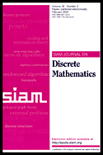
SIAM JOURNAL ON DISCRETE MATHEMATICS
Pioneering research for a mathematical future.SIAM Journal on Discrete Mathematics is a premier academic journal dedicated to the publication of high-quality research in the field of discrete mathematics. Published by SIAM Publications, this journal features original research articles covering a broad range of topics, including combinatorial optimization, graph theory, and algorithm design. With an impressive impact factor placing it in the top quartile (Q1) of mathematics journals, it is a valuable resource for researchers and practitioners looking to stay abreast of the latest advancements in discrete mathematics. Although currently not open access, the journal commits to disseminating rigorous and impactful findings that advance the understanding of mathematical concepts and their applications in various scientific domains. Renowned for its rigorous peer-review process, the SIAM Journal on Discrete Mathematics serves as an essential platform for scholars aiming to contribute to this evolving field, making it a must-read for anyone involved in mathematical research.
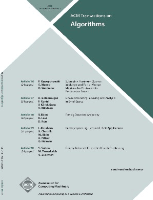
ACM Transactions on Algorithms
Elevating Algorithmic Research for Tomorrow's ChallengesACM Transactions on Algorithms (ISSN: 1549-6325, E-ISSN: 1549-6333) is an esteemed academic journal published by the Association for Computing Machinery (ACM), dedicated to advancing the field of algorithms within the broad domain of mathematics. With an impressive 2023 Quartile Ranking of Q1 in Mathematics (miscellaneous) and a Scopus rank placing it in the 15th percentile of its category, this journal is a pivotal resource for researchers, professionals, and students alike. Covering topics from algorithm design and analysis to applications in diverse areas, it serves as a platform for publishing high-quality, peer-reviewed research that significantly contributes to theoretical advancements and practical implementations. Although it is not an open-access journal, its impact in the academic community is profound, ensuring that vital findings reach a wide audience while promoting innovation and excellence in algorithm research. Established in 2005, with contributions continuing through 2024, ACM Transactions on Algorithms remains at the forefront of its field, underpinning significant developments and collaborations in algorithmic research.
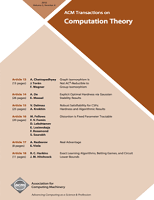
ACM Transactions on Computation Theory
Advancing the Boundaries of Computation Theory.ACM Transactions on Computation Theory, published by the Association for Computing Machinery, is a prestigious journal dedicated to advancing the field of computation theory and theoretical computer science. With an ISSN of 1942-3454 and an E-ISSN of 1942-3462, this journal serves as a vital resource for researchers and professionals seeking to explore groundbreaking developments in computational models, algorithms, and their mathematical foundations. The journal's rigorous standards have earned it a significant position within the academic community, as evidenced by its 2023 category quartiles, ranking in the Q1 category for Computational Theory and Mathematics and Q2 for Theoretical Computer Science. Although it operates through traditional subscription access, it maintains a critical role in disseminating cutting-edge research and fostering collaboration among experts in the United States and beyond. As an influential platform, ACM Transactions on Computation Theory is committed to contributing to the ongoing dialogue and advancement of computation theory, making it essential reading for anyone passionate about this dynamic field.

INTERNATIONAL JOURNAL OF THEORETICAL PHYSICS
Unveiling the Mysteries of Theoretical ResearchInternational Journal of Theoretical Physics is a premier academic journal dedicated to the advancement of knowledge in the fields of theoretical physics and mathematics. Published by Springer/Plenum Publishers, this esteemed journal has been a vital platform for researchers since its inception in 1968. With an impressive track record and an emphasis on high-quality, innovative research, the journal currently ranks in the third quartile (Q3) in both the Mathematics (Miscellaneous) and Physics and Astronomy (Miscellaneous) categories as of 2023. While the journal is not open access, it offers accessible subscription options for institutions and individuals. The International Journal of Theoretical Physics serves as an essential resource for scholars and practitioners looking to deepen their understanding and contribute to the evolving landscape of theoretical research, making it a key player in nurturing academic discourse and fostering collaboration in its field.
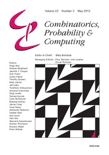
COMBINATORICS PROBABILITY & COMPUTING
Bridging Theory and Practice in Combinatorial ResearchCOMBINATORICS PROBABILITY & COMPUTING is a premier journal published by Cambridge University Press, focusing on the cutting-edge fields of combinatorics, probability, and their computational aspects. Established in 1992 and set to continue its impactful discourse through 2024, this journal holds a distinguished reputation, reflected in its Q1 ranking in applied mathematics, computational theory, and statistics, showcasing its pivotal role in advancing research in these areas. With an ISSN of 0963-5483 and an E-ISSN of 1469-2163, the journal welcomes high-quality papers that contribute to the theoretical foundations and practical applications of the disciplines. While it is not available as open access, its accessibility through institutional subscriptions ensures wide readership within academia. The journal is a vital resource for researchers, professionals, and students alike, providing a platform for innovative ideas and pioneering research that shapes the future of mathematics and computer science.

DISCRETE MATHEMATICS AND THEORETICAL COMPUTER SCIENCE
Shaping the Future of Computer Science through Discrete MathematicsDISCRETE MATHEMATICS AND THEORETICAL COMPUTER SCIENCE, published by DISCRETE MATHEMATICS THEORETICAL COMPUTER SCIENCE in France, stands as a significant open-access journal since 1997, publishing innovative research articles within the intersecting disciplines of discrete mathematics and theoretical computer science. With an ISSN of 1462-7264 and an E-ISSN of 1365-8050, this journal aims to provide a platform for scholarly discourse and dissemination of knowledge, making it accessible to a global audience. It is recognized for its contributions, achieving a Q2 ranking in both Computer Science (Miscellaneous) and Discrete Mathematics and Combinatorics, alongside a Q3 ranking in Theoretical Computer Science as of 2023. The journal’s rigorous selection process ensures that only high-quality research is published, promoting advancements in these critical areas of study. Researchers, professionals, and students alike can benefit from its comprehensive articles that not only enhance theoretical understanding but also foster practical applications in the ever-evolving landscape of computer science.

QUANTUM INFORMATION & COMPUTATION
Exploring the Frontiers of Quantum InnovationQUANTUM INFORMATION & COMPUTATION is a leading academic journal dedicated to the rapidly evolving fields of quantum information theory and quantum computing. Published by RINTON PRESS, INC, this journal serves as a pivotal platform for disseminating groundbreaking research, advancements, and theoretical insights in various domains including computational theory, mathematical physics, and high-energy physics. With its ISSN 1533-7146, the journal has established a solid reputation since its inception in 2001 and continues to engage researchers up to 2024. Despite its current standing in Q4 and Q3 quartiles across various categories, QUANTUM INFORMATION & COMPUTATION provides valuable contributions by fostering discussions on interdisciplinary applications and theories that challenge conventional paradigms. While the journal does not offer open access, it still supports a wide range of research topics, providing a vital resource for academics, professionals, and students keen on exploring the complex interplay between quantum mechanics and computation. By focusing on innovative techniques and theoretical developments, this journal is essential for anyone aiming to be at the forefront of the quantum revolution.
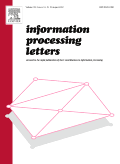
INFORMATION PROCESSING LETTERS
Empowering the Next Generation of Computational ThinkersINFORMATION PROCESSING LETTERS, published by ELSEVIER and with an ISSN of 0020-0190, is a prominent academic journal that serves as a vital resource in the fields of Computer Science, Information Systems, and Signal Processing, among others. As evidenced by its Q3 ranking across various categories in 2023, including Computer Science Applications and Theoretical Computer Science, it provides a rigorous platform for the dissemination of innovative research and theoretical developments. Researchers and professionals can delve into a wide array of subjects pertinent to information processing, contributing to advancements in technology and data management. Although it does not offer Open Access options, the journal maintains an influential presence in scholarly discourse, making it a crucial reference for those engaged in computational innovations and system optimizations. With coverage from 1971 to 2025, it continues to be integral for both seasoned academics and emerging scholars.

ALGORITHMICA
Unveiling the Power of Algorithms Across DisciplinesALGORITHMICA is a premier academic journal published by SPRINGER, dedicated to the field of algorithms and their applications across various domains. With an ISSN of 0178-4617 and an E-ISSN of 1432-0541, this journal serves as a vital resource for researchers and practitioners interested in the theoretical and practical aspects of algorithmic design and analysis. Recognized for its high impact, ALGORITHMICA is listed in the top quartile (Q1) for Applied Mathematics and Computer Science (miscellaneous) and is positioned in Q2 for Computer Science Applications in the 2023 category rankings. The journal has continuously contributed to advancing knowledge from its inception in 1986 to its ongoing publications through 2024. With a commitment to rigorous peer review and high-quality research, ALGORITHMICA is essential for anyone serious about pushing the boundaries of algorithmic study and application.